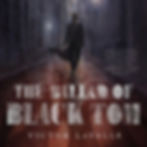
“The Ballad of Black Tom” by Victor LaValle is one of the books that came up when I was reading up on Black Speculative Fiction Month last October. This wonderful novella is inspired by H.P. Lovecraft’s story “The Horror at Red Hook,” one of the most notoriously racist of Lovecraft’s oft-bigoted tales of cosmic horror.
Now, I have to admit that I haven’t actually read “The Horror at Red Hook.” Critics seem to almost unanimously agree that, while much of Lovecraft’s fiction has strengths that elevate it above the author’s ugly prejudices, “The Horror at Red Hook” is essentially without any redeemable qualities. And, I also have to admit, while I have studied Lovecraft, and actually do enjoy a handful of his tales, for the most part I find his writing painfully archaic and obtuse. Even while his Cthulhu Mythos has inspired some of my own fiction writing, I have had to force myself through the majority of his work. So, without any redeeming qualities, I doubt I’d be able to finish “The Horror at Red Hook” if I did try to read it.
Now, it’s hard to get around the fact that Lovecraft is one of the most influential horror writers of all time, even while modern critics are finally acknowledging and deconstructing his unapologetic asshatery. How much are we willing to overlook in the name of art? This is something that a lot of horror and science fiction writers are considering.
“Lovecraft. . . opened the way for me,” writes Stephen King, “as he had done for others before me…. it is his shadow, so long and gaunt, and his eyes, so dark and puritanical, which overlie almost all of the important horror fiction that has come since.”
And it’s true. It seem inescapable. Even for those who have never read Lovecraft, it is impossible to read modern horror that has not been in some way influenced by his writing.
Reading “The Ballad of Black Tom” has really made me think about how much harder it must be for marginalized horror/SF writers to reconcile this influence in a positive way. LaValle’s dedication in his novella is poignant. “For H.P. Lovecraft,” it reads, “with all my conflicted feelings.” But “The Ballad of Black Tom” is a perfect example of how such a reconciliation might be accomplished.
“The Ballad of Black Tom” revisits the world of Lovecraft’s Red Hook neighbourhood from the perspective of a black man, Charles Thomas Tester, living in Harlem in the 1920s. My understanding of the Lovecraft original is that it’s basically a screed against brown people, immigrants, people who don’t speak English, and especially brown immigrants who don’t speak English.
LaValle actually does an excellent job of retaining the bigotry of some of these characters, while looking at them critically through the eyes of Tommy Tester. The horrors that Tester experiences are as much a product of racism in 1920s New York as they are the more cosmic horrors that his counterpart and erstwhile employer, Robert Suydem, is courting.
Tommy Tester’s experiences as he moves from Harlem, to Suydem’s upscale white neighbourhood, to the immigrant centre of Red Hook demonstrate the horror of being an outsider, of being othered by society. It is only when Tester has been completely isolated, after his own personal horror and loss has released him from his sense of humanity, that he becomes Black Tom–embracing inhumanity as a path to freedom. Even still, the true monsters in “The Ballad of Black Tom” are all-too human.
Ruthanna Emrys sums it up nicely in a review for Tor. “The task of today’s cosmic horror—if it seeks to touch on readers’ real fears, and not simply reflect the squids of particular authors—is to connect the vast inhumanity of an uncaring universe with the vast inhumanity of entirely banal humans,” she writes. “This, LaValle accomplishes admirably. Cthulhu is a metaphor for us; we become, if we aren’t careful, a metaphor for Cthulhu.”

